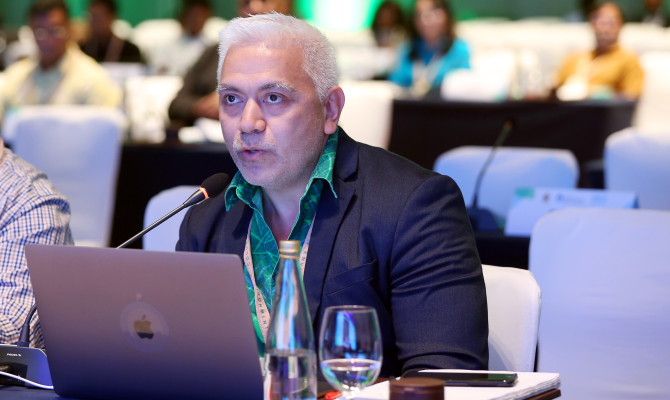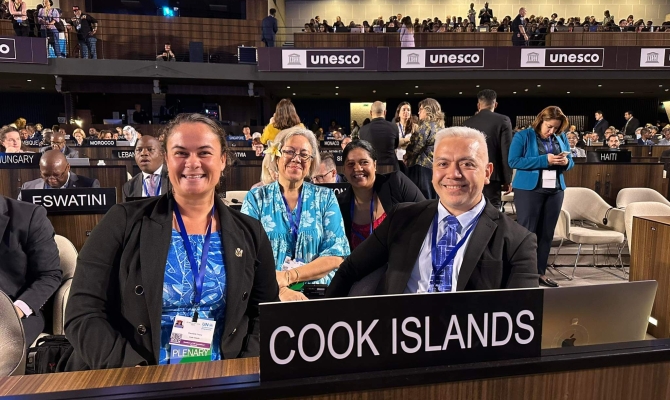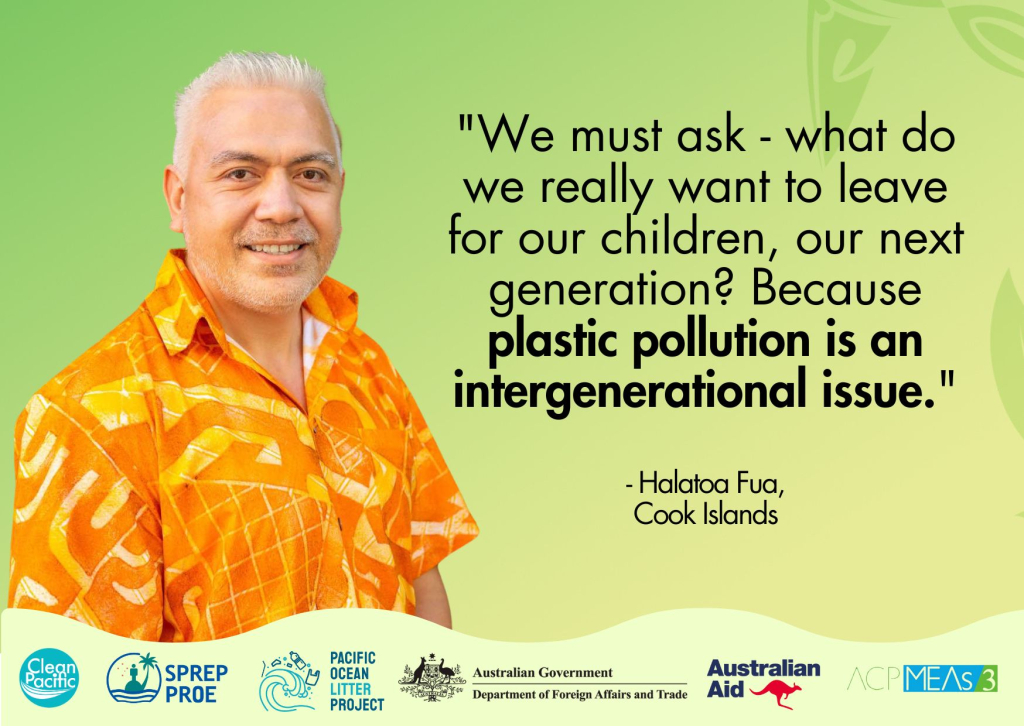
10 July 2025, Apia - The second part of the fifth session of the Intergovernmental Negotiating Committee to develop an international legally binding instrument on plastic pollution, including in the marine environment (INC-5.2) in Geneva, is shaping up to be a defining moment in the work to create a legally binding global plastics treaty.
Since March 2022, when the UN Environment Assembly issued a mandate to create a treaty that would address the entire life cycle of plastic, from design and production to disposal, and despite five INC sessions between 2022 and 2024, plastic pollution has continued to rise with the production of virgin plastics predicted to double by 2040.
This is of grave concern to Pacific communities who are at the forefront of the impacts of the plastic pollution crisis.
Prior to INC-1, and since the start of the INC process, Director of the Cook Islands National Environment Service, Mr Halatoa Fua, has participated in each, calling consistently for a high-ambition treaty that addresses the full life cycle of plastic.
As attention turns to Geneva and the magnitude of the task there, we catch up with Mr Fua on the margins of the sixth Pacific Regional Preparatory Meeting in Samoa, where he has joined Pacific negotiators to strategise, and discuss priority issues, refine negotiating strategies, and build consensus on key positions.
Question: Kia Orana Halatoa. You have been part of this process since INC-1 in Uruguay, can you quickly talk us through the work that has been done?
Halatoa Fua: We’ve come a long way. I think one of the positives is that we’ve been able to progress the discussions. We’ve gone through vetting a lot of the national positions, the divergence, we’ve formed an elements paper, we’ve gone through a compilation text and now we are trimming it down, with the hope that when we go to INC5.2 that we will reach an agreement.
From a Cook Islands, and PSIDS perspective, what’s important for us is we come out of these negotiations with an agreement. If we don’t have an agreement, we need to have a clear way forward as to how we can still prioritise the addressing of plastic pollution under the UN Framework. We are enthusiastic to have an agreement, but we also understand the challenges we will face in reaching an agreement under a full lifecycle approach.

Question: We know this has been a long hard road, with a lot of challenges? Can you share with us some of those challenges?
Halatoa Fua: Some of the challenges that we’ve encountered and see from a Pacific perspective, is that a lot of the science is already showing that the level of production will double by 2040. We are already dealing with discarded fishing gear, plastic litter -not just on terrestrial but also in the Pacific Ocean, so the marine environment plays a key impetus for us to be involved in this treaty to make sure the Ocean is protected as part of our culture and history in the Pacific.
It’s important for us to engage, and we are very thankful that there is a lot of coordination within PSIDS as well as AOSIS. We are very proud to have Palau as a Pacific country leading AOSIS and Tuvalu leading PSIDS, and we will continue to build on a strong negotiation strategy going to INC5.2. The PSIDS preparatory meeting is vital in terms of that plan and strategy so we can engage effectively in Geneva.
Question: Speaking of the plan and the strategy, can you please talk us through some of your discussions during the past couple of days in Samoa? You have also been talking about articles in a possible treaty, what do you see as some of the key ones for the Pacific?
Halatoa Fua: Let me say that we believe all articles are important but I think the key of all those articles for us is to ensure that the scope of a treaty is on a full lifecycle approach. In Samoa during the past couple of days, we’ve been talking a lot about what’s referred to as the compromised package of articles 3 (products), 6 (production and supply) and 11 (financing). For the Pacific, those are the three most important articles because we want the treaty to be effective, where there is Articles 3 and 6 to address production, chemicals and products. For us, having some sort of global approach will help us alleviate some of the limited capacity we might have in our recycling and waste management systems, and then with the financial mechanisms as SIDS, we have special circumstances that needs to be addressed and we see that article on finance is key.

Question: Looking at Geneva, what is your gut feeling about what could happen?
Halatoa Fua: Our intention is to go to Geneva with a mindset that we will try and reach an agreement. We have to look at the procedural environment that will allow us to negotiate in those spaces and as you know in those negotiations, it’s all about compromises. So it’s about understanding if some countries have issues around an effective treaty, where do they see their willingness to compromise and we as Pacific SIDS also know where we need to compromise. That is the intention. We are mindful of course that not having an agreement is always a risk, it’s always there, we’ve seen the trend but the objective for us is to try and reach an agreement on this treaty, and then having a plan on how do we address it if we don’t reach an agreement.
Question: Lastly, what does this treaty mean for the people of the Cook Islands?
Halatoa Fua: The Cook Islands is 2 million square kilometers in our EEZ, the land base is less than 1 percent, so plastic litre in the marine environment is an issue for us. We have made some bold national commitments. We have just passed our Solid and Hazardous Waste Bill. This bill has a new list of eight plastic items that are being banned. We are also introducing an Advanced Disposable Fee on collecting some of the disposable costs when we import the goods. So we are addressing it through national legislations to improve waste management as well as the ‘reduce’ component of the waste hierarchy. We have been successful in the circular solution to end plastic pollution GEF funding where the Cook Islands will be getting about 10 million NZ dollars and we will be using that fund on changing consumer behaviour, moving towards refill systems and trying to avoid single use plastics as much as we can. So the national commitment is there.
What this treaty will do from a multilateral perspective is it will help us with our capacity, in regional frameworks through SPREP, such as the Waigani and the Noumea convention. Capacity building, financial mechanism, technology transfer, those are all additional extremely important value adds that can help us accelerate the work to end plastic pollution.
The Pacific Regional Preparatory meeting for the second part of the fifth session of the Intergovernmental Negotiating Committee to develop an international legally binding instrument on plastic pollution (INC-5.2) is this week in Apia, Samoa from 7-9 July 2025.
Facilitated by SPREP, the workshop is funded by the Government of Australia through the Pacific Ocean Litter Project (POLP). The INC-5.2 Pacific Regional Preparatory Meeting is attended by Australia, Cook Islands, Federated States of Micronesia, Fiji, Kiribati, Nauru, New Zealand, Niue, Palau, Papua New Guinea, Samoa, Tonga, Tuvalu and Vanuatu.
Main photo credit: Photo by IISD/ENB | Francis Dejon